
City Palace / The Lounge
Page updated 31st August 2014
 Renamed
the Lounge 80-81, Fore Street
Renamed
the Lounge 80-81, Fore Street
In April 1912, the City Pictures Co. converted Shephard & Co, a grocer's shop, next to the modern Wetherspoon's Chevalier Inn, into the City Palace, a cinema which could seat 380. It was a private company that had been founded by a number of Exeter's business and professional men. Business was good, and the 'home of bright and beautiful pictures' earned dividends for the investors as high as 40%.
For the first Christmas of trading, in 1912, the Gazette reported the programme as:
"The City Palace, Fore-street, Exeter, are making an exceptional bid for popular favour during the Christmas holidays. For the latter half of this week a special coloured pantomime, "Babes the Wood," now being shown at the London Opera House, is the principal item in the programme. Other dramatic, humorous, and interesting pictures are also announced. The Management intend to continue holiday programmes during the next two or three weeks, including the exclusive picture, "The Boy Scout Hero" and " Capt. Scott at the South Pole," both of which will meet with considerable favour among holiday seekers."
The City Palace co-operated with the Theatre Royal, by providing films for the theatre. This allowed the theatre to attract larger audiences, although what the City Palace got out of the deal is unclear. The first programme under this arrangement was in February 1914 when Sixty Years a Queen was presented.
"Next week the cinematograph series “Sixty Years a Queen” will be presented each afternoon and twice each evening. Depicting the life story of Queen Victoria in elaborate fashion, it forms one of the most impressive and instructive moving picture series now before the public, and is being presented at the Theatre Royal in co-operation with the directors of the City Palace. Its educational value is great, and it is expected that large numbers of students and scholars will be present during the week."
Competition was fierce between the various cinema houses during the First War, and any means of offering an enticement to attend was made. From 1 January 1916, the City Palace offered to serve tea that would be “daintily served 3.45–4.15". Similarly, the modern Picture House has a pleasant café and bar, which marks it apart from the two large cinema chains in the city.
The Express and Echo was the preferred avenue of promotion by the City Palace in March 1917 and they advertised French official War Office Films and “EVERYBODY’S BUSINESS (by Government Authority)”. The public were keen to have the latest war news, even if it was blatant propaganda.
Controversy
In June 1918, the City Palace heavily promoted in the Express and Echo the film "Where are my Children?", a propaganda film with an anti-abortion message. It was shown in a small number of venues around the country, because it had no BBFC certificate, and the cinema stated it to be a film for adults only. The Express and Echo approved of the film and stated it contained “the most artistic effects cinema art has attained”. The Empire Electric retaliated by stating it provided “ideal family entertainment” and was “the house of taste and refinement”.
A 1930 trade directory has the following entry under Amusements:
City Palace, 80 and 81 Fore st.; high-grade photo plays; continuous from 2 till 10.30. Mrs L Williams, manageress. Phone No. 3751
The break in
Although a small cinema, even relative to its rivals before the arrival of the large, purpose built, cinemas that were constructed in Exeter during the 1930s, the City Palace proved to be attractive to a couple of opportunist thieves on Sunday the 18 May 1930, when the cinema was closed. William Plumer a window cleaner, and Frederick Meacham, a labourer were charged with breaking into the City Palace on the 18 May, and stealing 45 transfer tickets and 9d in cash. The men gained access by climbing a drainpipe in Milk Street, crossing a roof and entering by an unsecured window. They were caught by a member of staff who had reason to visit the premises. Plumer was sentenced to four months hard labour, and Meacham to three months.
In August of the same year, the cinema suffered an all too common fire in the projection box, caused by some spools of nitrate film, that is highly flammable. The audience were asked to evacuate the premises, and the fire brigade ran a hose into the building, to quickly quench the flames.
Sound equipment
The City Palace was the last cinema in Exeter to show silent films. It stopped its matinee performances in July 1931, and ticket price was reduced to 4d, 6d, 8d and 1 shilling, believing that there were still fans of silent film. However, the City Palace could only hold out until November before it abandoned silent film completely. The cinema was put under new management, and was closed while British Thomson-Houston Company sound equipment was installed, new seating fitted, and the cinema was redecorated. It was also renamed the Lounge.
The last film to be shown was A Midsummer Night's Dream with Victoria Hopper on 19th December 1937. After that is was converted back into a shop, only for the building to be destroyed in the blitz.
Sources: Trewmans Flying Post, Western Times and Exeter and Plymouth Gazette, article by Alex Rankin on the Bill Douglas Centre website at exeter.ac.uk/bdc
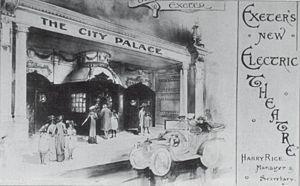 Promotional card for the City Palace. There is considerable license taken with the view taken, as the shop front was probably no wider than 18 ft.
Promotional card for the City Palace. There is considerable license taken with the view taken, as the shop front was probably no wider than 18 ft.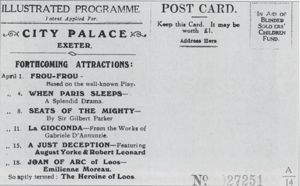 This card was the programme for a week in 1916.
This card was the programme for a week in 1916.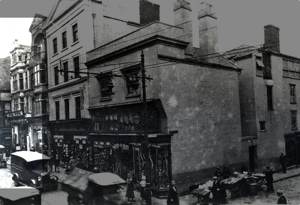 The City of Exeter
Palace Cinema was the shop front on the extreme left. Milk Street is on
the right.
The City of Exeter
Palace Cinema was the shop front on the extreme left. Milk Street is on
the right.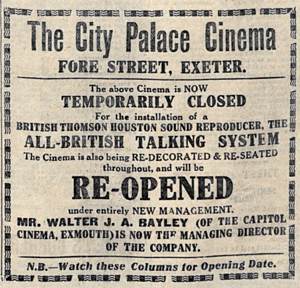 An advert announcing the installation of sound equipment in November 1931.
An advert announcing the installation of sound equipment in November 1931.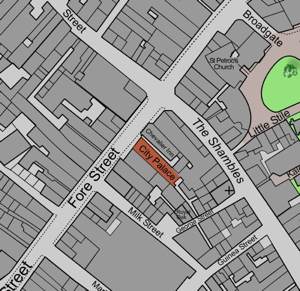 The City Palace shown in red, was next to the original Chevalier Inn.
The City Palace shown in red, was next to the original Chevalier Inn.
│ Top of Page │